Transposing the Formulas in a Table of Cells
Recently someone asked me if it was possible to transpose a table of cells, but in such a way that the formula of each cell is kept intact. I decided VBA was the way to go and produced a small but very useful little routine for that.
Imagine the following table:
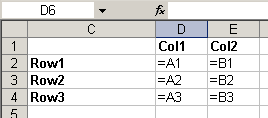
Now I'd like to transform that table into this one (see highlighted range):
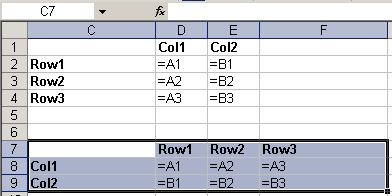
If you try a copy > paste special > formulas > transpose, this is what you get:
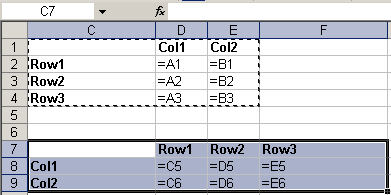
But it is not what we want, is it.
With the following piece of VBA, you can easily transpose your table, without garbling your formulas:
Option Explicit
Sub TransposeFormulas()
Dim vFormulas As Variant
Dim oSel As Range
If TypeName(Selection) <> "Range" Then
MsgBox "Please select a range of
cells first.", _
vbOKOnly + vbInformation, "Transpose formulas"
Exit Sub
End If
Set oSel = Selection
vFormulas = oSel.Formula
vFormulas =
Application.WorksheetFunction.Transpose(vFormulas)
oSel.Offset(oSel.Rows.Count + 2).Resize(oSel.Columns.Count,
oSel.Rows.Count).Formula = vFormulas
End Sub
So how does this work?
First we check whether a range of cells has been selected, otherwise the code will produce a runtime error:
If TypeName(Selection) <> "Range" Then
MsgBox "Please select a range of
cells first.", _
vbOKOnly + vbInformation, "Transpose formulas"
Exit Sub
End If
Next, we store the selected cells in an object variable (which is not really necessary), so we can work with that set of cells:
Set oSel = Selection
Now the formulas of these cells are pulled into a variable of type Variant in one go:
vFormulas = oSel.Formula
If you step through the code (using my example) the Locals window of the Visual Basic Editor (VBE) shows this for the variable vFormulas after executing the statement above:
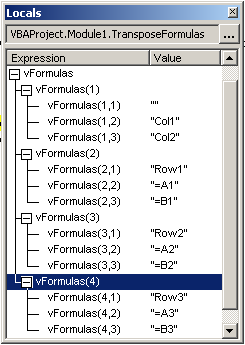
As you can see, vFormulas is a 4*3 array.
Next we want to swap rows and columns of the vFormulas variable, for which I use the Transpose worksheet function:
vFormulas = Application.WorksheetFunction.Transpose(vFormulas)
The structure of vFormulas changes to this:
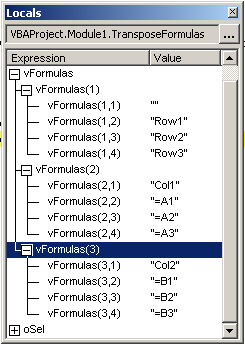
Presto! We now have a 4 * 3 array.
Finally, we need to push back the formulas to the worksheet. To be able to do that, we must specify a target range of the exact dimensions as the array variable. For that I use the Resize method. Note I also move down a couple of cells using Offset, so the copy of the table is placed 2 rows below the original:
oSel.Offset(oSel.Rows.Count + 2).Resize(oSel.Columns.Count, oSel.Rows.Count).Formula = vFormulas
Done!

Comments